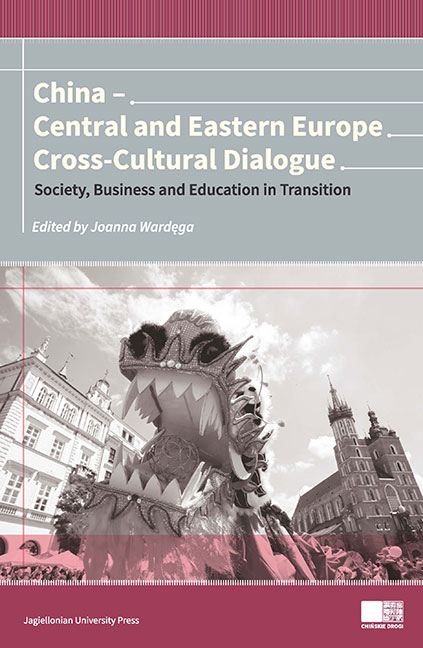Book contents
- Frontmatter
- Contents
- Foreword
- PART I Society and Culture in Transition
- Idealism and Relativism in Ethics: Comparing China and Central Eastern Europe (CEE)
- China's Role in the New World Order
- Redefining and Elderly Caregiving in the 21st Century China and Poland
- Roadmap for Moving to a Low Carbon Economy in China and Poland. Comparative Analysis
- Chinese Community in Poland – the Dynamics of its Development
- Perceptions of China among Central and Eastern European University Students
- Transformation of the Dragon – China's Image in the Polish Media
- Bridges and Obstacles in “the Way of the Ideal Government”: the Transition from Mind Confucianism to Political Confucianism from Jiang Qing's Point of View
- Conceptualizations of Constitutionalism in Recent China's Debates: Preliminary Typologies
- PART TWO Economy and Markets in Transition
- PART THREE Education in Transition
- Contributors
Roadmap for Moving to a Low Carbon Economy in China and Poland. Comparative Analysis
from PART I - Society and Culture in Transition
Published online by Cambridge University Press: 22 December 2017
- Frontmatter
- Contents
- Foreword
- PART I Society and Culture in Transition
- Idealism and Relativism in Ethics: Comparing China and Central Eastern Europe (CEE)
- China's Role in the New World Order
- Redefining and Elderly Caregiving in the 21st Century China and Poland
- Roadmap for Moving to a Low Carbon Economy in China and Poland. Comparative Analysis
- Chinese Community in Poland – the Dynamics of its Development
- Perceptions of China among Central and Eastern European University Students
- Transformation of the Dragon – China's Image in the Polish Media
- Bridges and Obstacles in “the Way of the Ideal Government”: the Transition from Mind Confucianism to Political Confucianism from Jiang Qing's Point of View
- Conceptualizations of Constitutionalism in Recent China's Debates: Preliminary Typologies
- PART TWO Economy and Markets in Transition
- PART THREE Education in Transition
- Contributors
Summary
China and Poland underline the principle of maintaining a balance between population, resources, and environment. Considering similar energy structure with the dominant role of coal and significant environmental problems, both countries should initiate a revolution in the areas related to the production and the use of energy by promoting energyefficient, low carbon development of the industry, as well as new and renewable sources of energy in building the country's energy security. They also have to establish a system for protection of arable lands, water resources and environmental protection management systems.
The need for greater diversification within the existing energy structure is forcing both China and Poland to take the activities related primarily to: restructuring the coal sector, which should result in increased competitiveness, and the promotion of clean coal technologies; promotion of energy efficiency; development of renewable energy sources as well as lifting capacity in nuclear power plants and increasing the importance of natural gas in the energy mix.
Main research questions posed in this paper concern the perception of low carbon development, the overall energy mix in China and Poland and their intensity for carbon reduction targets. The major goal of this paper is to present firstly, that the transition to a low carbon economy in both countries leads to improving the environment. Secondly, that the environmental protection is a rising policy priority, both in China and Poland, and thirdly, that the renewable energy market dynamics combined with the efficiency improvement should enhance their bargaining position in the global energy market.
Global Transition to a Low Carbon Economy
Low Carbon Economy (LCE) means the economy primarly characterized by the separation of greenhouse gas emissions from the economic and social growth, mainly by reducing the use of fossil fuels, including coal, oil and natural gas, that are currently the world's primary energy source. It is based mainly on the energy efficiency, the use of renewables and technological innovation help to limit greenhouse gas emissions. It is also an aleternative system of production and consumption, allowing to conserve the energy and to reduce greenhouse gas emissions (GHG).
- Type
- Chapter
- Information
- China - Central and Eastern Europe Cross-Cultural Dialogue Society, Business and Education in Transition , pp. 63 - 82Publisher: Jagiellonian University PressPrint publication year: 2016



